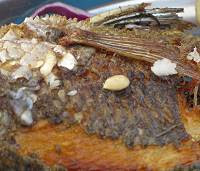In John 11 we see both aspects of Yahshua's life coming together. this is not surprising as events are coming to a focal point,
 his death on the cross and resurrection three days later.
his death on the cross and resurrection three days later.First there is the deep love he had for his close friends Mary, Martha, and Lazarus (verse 5) - so much so that he wept with the tenderness he felt for them in their grief. They lived in Bethany just outside Jerusalem and he often stayed with them when he was in the city. Here we see the human aspect of the Lord, his fondness for these friends and his concern for them in their trouble. The disciples must have been surprised when he received the news of Lazarus' illness but didn't go right away to help him. Perhaps they thought it was because Jerusalem was unsafe for him.
So they are surprised again when, two days later, he does decide to head for Judaea. (verse 7)
Then we see his powerful heavenly aspect as he calls Lazarus out from the tomb. (verse 43) Is there any significance in the fact that this miracle came just before his own death? It would have been fresh in his mind as he was hanging between the two thieves. Those who witnessed his tears were agreed that he loved Lazarus deeply. Some of them referred to the Messianic miracle of healing the blind man and expressed surprise that he hadn't prevented the death of such a deeply loved friend. But later, divided as ever, many of them believed because of the raising of Lazarus. (verse 45) Those that did not believe went to tell the Sanhedrin.
Yahshua is totally focused on obedience to the Father in fulfilling all he had been sent to do, and care for the people amongst whom he lived. These two aspects of his nature, love for the Father and love for his friends are an outworking of the new commandment, the one that fulfils the Law in every respect - love the Almighty with all that is in you, and love your neighbour as you love yourself.
The Lord taught this throughout his ministry, demonstrated it throughout his life, and now demonstrates it finally again as his earthly life approaches an end that will be as extraordinary and unexpected as its beginning had been thirty years earlier.
Truly he is fully here on earth yet fully there in heaven, he is human yet also the great I AM. HalleluYah!
< John 10 | Index | John 12 >






